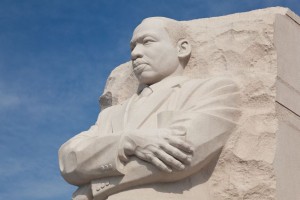Honor MLK: Support Restoration of the Voting Rights Act
 The main statue in the Martin Luther King, Jr. Memorial, Washington, DC.
The main statue in the Martin Luther King, Jr. Memorial, Washington, DC. Monday is Martin Luther King Jr. Day, a celebration not only of the life of one man but of the rights that he fought much of his life to extend to all people regardless of their race, religion, gender, or other factors. A major part of the fight for equality was the call for reformation of the voting system in the United States, which discouraged and prevented racial minorities from voting through poll taxes, testing requirements, a lack of voting stations in minority neighborhoods, and other methods to reduce access to voting.
In fact, Martin Luther King Jr.’s efforts were instrumental in the historic passage of the Voting Rights Act of 1965, which sought to enfranchise the large number of black people in the United States who were unable to vote because of such discriminatory practices. For example, Section 2 of the Act prohibits any jurisdiction from implementing a “voting qualification or prerequisite to voting, or standard, practice, or procedure … in a manner which results in a denial or abridgement of the right … to vote on account of race” and allowed private citizens who felt their right to vote had been infringed to settle the matter in court.
Another aspect of the Act, Section 5, maintained something called a “preclearance requirement” that prohibited certain parts of the United States (mainly in the South) with a long history of denying voting rights to minority communities from passing and enforcing voting laws without approval from the US Attorney General.
Just which areas of the country where bound by Section 5 of the Act was determined by a coverage formula included in Section 4. The places subject to the preclearance requirement were truly the worst of the worst when it came to illegal actions meant to stop black people from voting, and, according to the Department of Justice, included the entire states of Alabama, Alaska, Georgia, Louisiana, Mississippi, South Carolina, and Virginia.
Though this formula was extremely effective in the decades since the Act’s passage in preventing voter disenfranchisement and forms of voter deception and intimidation, the Supreme Court ruled it unconstitutional in the 2013 case Shelby County v. Holder, calling it outdated and punitive towards regions that no longer practice voter discrimination.
The preclearance requirement itself still stands, however by removing the formula used to determine preclearance, the Supreme Court effectively freed formerly covered areas from having to clear new voting laws in federal court.
Thankfully, a new formula has been conceived as part of a piece of legislation introduced earlier in this session of Congress. The Voting Rights Amendment Act, which has bipartisan support, has created a new formula using the latest voting data to mollify the Supreme Court’s concerns about coverage for the preclearance requirement. If the bill is passed, Section 5 of the original Voting Rights Act will once again become enforceable, and voting rights for the most vulnerable communities will once more be protected by the federal government.
Martin Luther King struggled for years to ensure that the most fundamental freedom in a democracy, the right to vote, was extended to all Americans. We can honor that legacy and continue his work by supporting the Voting Rights Amendment Act, and by working to ensure that attempts to disenfranchise voters, whatever the reason, are fought against and defeated.
